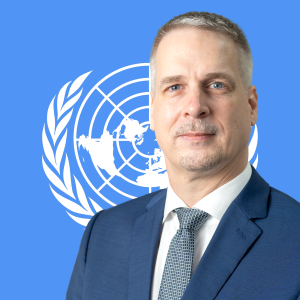In the Pacific, we understand deeply the importance of "Talanoa"—the process of open, honest dialogue that brings people together, fosters understanding, and inspires collective action.
Today, we are here to engage in just that. This workshop is our opportunity to exchange knowledge, strengthen our responses, and gather the essential data we need to protect the health and wellbeing of our people.
We know that in our island nations, where the ocean connects us, yet distances pose challenges, access to accurate and timely information is like the wind that fills our sails. Without it, we risk drifting off course. The HIV epidemic in Fiji, where new infections are rising at alarming rates, is not just Fiji’s burden—it is a Pacific-wide issue.
This crisis threatens our region’s health security, and we must steer together as one vaka, guided by the knowledge we share and the action we take.
I want to take a moment to acknowledge the Hon. Minister for Health of Fiji for the leadership and commitment shown by the government in prioritizing the HIV response on the national agenda. The work being done by the Fiji government sets an example across the Pacific as a true leader in confronting this crisis. Through its efforts to strengthen health systems, ensure access to treatment, and drive awareness at the community level, Fiji is showing what is possible when we place HIV at the forefront.
In Pacific villages, it is often said it takes a community to raise a child. In the same way, it takes a region to overcome a crisis. Our collective strength lies in the ability to work together for a common goal. This is why strategic information and accurate data are so critical. It gives us the visibility to navigate the complexities of the epidemic, ensuring that our responses are guided by facts and targeted where the need is greatest.
Data has the power to save lives. Imagine a young person living in a remote area of the Pacific Islands—perhaps in Tonga, Vanuatu, or Solomon Islands—being flagged through timely data for immediate intervention.
Because of the information shared quickly across health systems, that individual receives life-saving antiretroviral treatment without delay. This swift, informed action could be the difference between life and death. Data empowers us to act decisively, and every report, every statistic, and every piece of information we collect brings us closer to a future where no life is lost to HIV.
As part of the United Nations system, UNAIDS plays a critical role in leading the global HIV response, but here in the Pacific, it is uniquely embedded within the UN Office of Resident Coordinator, in my office.
This structure positions UNAIDS as a central player in coordinating our joint efforts to fight HIV, ensuring that our response is integrated with broader health and development goals. The HIV response in the Pacific is not just a matter of public health; it is a pressing issue of regional concern. As your Resident Coordinator, this is an issue that is of the highest priority for me, as it directly impacts the health security and resilience of our island nations.
The UN family stands united in this effort. Alongside UNAIDS, other UN agencies like the World Health Organization (WHO), UNICEF, UNFPA, UN Women, and UNDP have been working together, pooling their expertise to avert new HIV infections and support those living with HIV.
WHO is instrumental in providing health guidance and setting global standards for treatment and care. UNICEF focuses on ensuring that children and adolescents are protected from HIV, especially in the most vulnerable communities. UNFPA leads efforts to integrate HIV prevention into sexual and reproductive health services, while UN Women champions gender equality and addresses the intersecting challenges that women and girls face in this epidemic.
UNDP, as the Principal Recipient for the Global Fund, plays a critical role in mobilizing resources and strengthening health systems to ensure that our collective efforts are sustainable and far-reaching.
Before I conclude, I would like to remind the esteemed Rapporteurs of the significant role entrusted to you by your governments. You are not only collectors of data—you are guardians of the information that shapes the future of our HIV response. The data you produce has the power to inform life-saving decisions and drive impactful action. Through your work in this workshop, the lives of many will be safeguarded, and together, we will chart a clearer path to ending AIDS in our Pacific region.
Our united approach reflects the importance of leaving no one behind. By working together, we ensure that our interventions are coordinated, impactful, and tailored to the unique needs of the Pacific. It is through this shared commitment that we can hope to turn the tide on the HIV epidemic and move closer to ending AIDS by 2030.
I also want to acknowledge and thank the Australian Government for their unwavering support through the Indo-Pacific HIV Partnership to UNAIDS. Their commitment to this cause is like the strong vaka that helps us cross the rough waters. Their investment in strengthening HIV responses throughout the Pacific is helping to build a future where our people can live healthy, dignified lives, free from the threat of AIDS.
As we continue on this voyage together, let us remember the values that define us as Pacific people—resilience, community, and unity. The winds may change, and the seas may get rough, but as long as we work together, keeping our focus on our shared destination, we will reach our goal of ending AIDS by 2030.
Vinaka vakalevu, Dhanjavaad, Fa'afetai tele lava, Fakafetai lasi, Ko rabwa , and thank you all. Let’s make the next few days a powerful moment of learning, sharing, and action. Together, we can sail towards a healthier and brighter future for our Pacific region.





